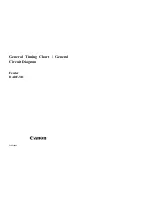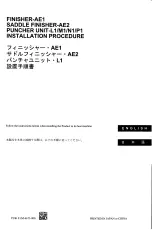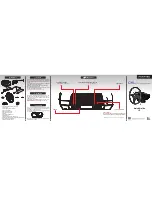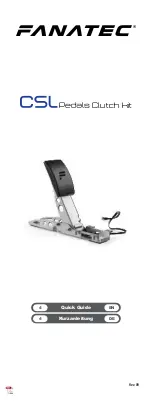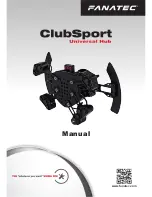
Operating Instruction
Version 02/06
Sensor KW-9010
Item No. 646177
Intended use
The product measures the environment temperature and transmits it to a suitable
receiver (appropriate weather station/thermometer) Moreover, it has a built-in display
which displays the measured temperature.
Safety instructions
We do not assume liability for resulting damages to property or personal
injury if the product has been abused in any way or damage by improper use
or failure to observe these operating instructions. The guarantee will then
expire!
The exclamation mark points out important information in these operating
instructions that must be strictly adhered to.
Unauthorised conversion and/or modification of the appliance are inadmissible
because of safety and approval reasons (CE).
The appliance must not be exposed to extreme temperatures, direct sunlight, intense
vibration, high humidity, dampness or severe mechanical stress.
This appliance is not a toy and should be kept out of reach of children.
This appliance must be handled with care. It may be damaged through the impact of
a fall.
Servicing, adjustment or repair works must only be carried out by a specialist/
specialist workshop.
If any questions arise that are not answered in this operating instruction, contact our
Technical Advisory Service or other experts.
Operationg elements
Transmitter LED (flashes briefly
during data transmission)
LC Display
Temperature probe socket cover
Temperature probe plug
Temperature probe
Mounting eyelet
A.
B.
C.
D.
E.
F.
Battery compartment
Channel selection slide switch
ºC/ºF selection button
Transmission button “TX”
Foldable stand
Battery compartment cover locking
screw
Battery compartment cover
G.
H.
I.
J.
K.
L.
M.
Positioning
When drilling, be careful not to damage any power supply lines, gas or water
pipes by mistake!
Do not drill any additional holes on the appliance’s casing to mount it.
Position the appliance in a protected area.
The appliance can either be placed on level surface or mount on wall. To place it on
level surface, fold out the foldable stand (K) and then place it on a level and sturdy
surface. To mount on wall, screw the screws into a wall but not completely, leave
roughly 3mm between the bottom of screw cap and the wall. Line up the mounting
eyelet with the screw and slide the appliance down to insure secure mounting.
The transmission range of the appliance is approximately 30m (free-field).
The range is reduced by obstruction, such as, walls, insulation glass windows,
metal parts, and electrical devices.
If you encounter reception problems, then change the location of remote
sensor or the reception unit.
Battery insertion and replacement
Observe correct polarity while inserting the batteries. Remove the batteries if
the appliance is not used for a long period of time to avoid damage through
leaking. Leaking or damaged batteries might cause acid burns when contact
with skin, therefore use suitable protective gloves to handle corrupted
batteries.
Keep batteries out of reach of children. Do not leave the battery lying around,
as there is risk, which children or domestic pets could swallow it.
Replace all the batteries at the same time. Mixing old and new batteries in
the appliance can lead to battery leakage and appliance damage.
Make sure that batteries are not dismantled, short-circuited or thrown into
fire. Never recharge non-rechargeable batteries. There is a risk of explosion!
Replace the batteries if there is no display shown in the LC display (B) of the appliance
or the reception unit signalises a low battery icon,
, on its display.
Loosening the screw (L) and remove the battery compartment cover (M) at the
back of the appliance.
Insert two micro batteries (AAA) with the correct polarity. Please refer to
1.
2.
inscription on the battery compartment (G).
Close the battery compartment cover (M) and tighten the screw (L).
After the batteries were inserted, the measured data will be transmitted to the
reception unit in approximately every 30 seconds.
Configuration
Loosening the screw (L) and remove the battery compartment cover (M) at the
back of the appliance.
Select the desired temperature unit by pressing ºC/ºF selection button (I).
Select the channel of the remote sensor by sliding the slide switch (H). Each
remote sensor has to be set to a different channel. After adjusting the slide
switch press “TX” (J) to register the remote sensor to a new channel.
Press “TX” (J) to manually transmit measured data to the reception unit. The
reception unit will generate an acoustic signal if it received the data.
Temperature probe connection
Place the probe (E) outside and locate the remote sensor indoor to avoid freezing up
the batteries when outdoor temperature is below zero. To connect the temperature
probe, lift the probe socket cover (C) and insert the probe plug (D).
Maintenance
Clean the appliance with dry, anti-static cloth. Do not use abrasives or solvents!
Disposal
Waste electrical and electronic equipment disposal
In order to preserve, protect and improve the quality of environment, protect
human health and utilise natural resources prudently and rationally, the
user should return unserviceable product to relevant facilities in accordance
with statutory regulations.
The crossed-out wheeled bin indicates the product needs to be disposed
separately and not as municipal waste. It is used in conjunction with either
solid bar or date of manufacture/ put on the market.
Used batteries/ accumulators disposal
The user is legally obliged to return used batteries and accumulators.
Disposing used batteries in the household waste is prohibited!
Batteries/
accumulators containing hazardous substances are marked with the crossed-
out wheeled bin. The symbol indicates that the product is forbidden to be
disposed via the domestic refuse. The chemical symbols for the respective
hazardous substances are
Cd
= Cadmium,
Hg
= Mercury,
Pb
= Lead.
You can return used batteries/ accumulators free of charge to any collecting
point of your local authority, our stores or where batteries/ accumulators
are sold.
Consequently you comply with your legal obligations and contribute to environmental
protection!
Technical data
Measuring range
–50.0 °C to +70.0 °C (–58.0 °F to 158.0 °F)
Operating temperate
–20 °C to 60 °C (–4°F to 140° F)
Resolution
0.1 °C (0.2 °F)
Radio transmission
frequency
433 MHz
Radio transmission range
maximum 30 metres in open area
Power supply
2 x Micro batteries (AAA)
Weight
approx. 86 g (excluding batteries)
Dimensions (H x W x D)
95mm x 60 mm x 28 mm
Declaration of conformity
Hereby, Conrad Electronic, Klaus-Conrad-Straße 1, 92240 Hirschau, declares that this
product is in compliance with the essential requirements and other relevant provisions
of Directive 1999/5/EC.
The declaration of conformity is available on www.conrad.com or web site of original
manufacturer.
3.
•
•
•
•
These operating instructions are published by Conrad Electronic GmbH,Klaus-
Conrad-Str.1,92240 Hirschau/Germany
The operating instructions reflect the current technical specifications at time of
print. We reserve the right to change the technical or physical specifications.
© Copyright 2006 by Conrad Electronic GmbH.



